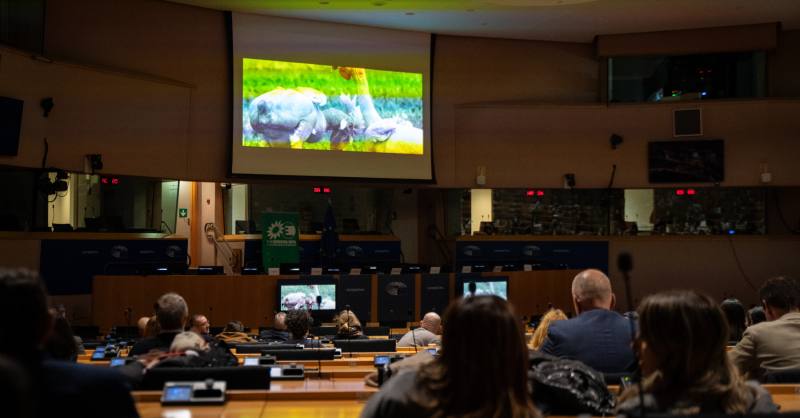

The first feature documentary that exposes the links between the meat industry, lobbying, and the corridors of power.
The documentary film by journalists Giulia Innocenzi and Pablo D'Ambrosi, to which LAV contributed by coordinating investigations in some factory farms in Italy, Germany, Poland and Spain is finally out.
Premieres were held at the Bruxelles Parliament, Rome and Milan.
It is a five-year work that clearly shows how European politics is in fact in the pay of some meat lobbies that have no scruples about protecting the health of citizens and the rights of animals, of which more than 630 million are bred every year in Italy alone.
An in-depth work that has opened the Pandora's box of interests of businessmen and some MEPs.
The close link between animal lobbies and politics is illustrated by images taken with a hidden camera by a lobbyist who recorded several meetings with some MEPs from different political groups and different nationalities, including some Italians.

The request seems to be immediately clear to the MEPs, who are willing to go along with the absurd proposal: to cash in on political support for amendments to increase the profits of the livestock industry, without any scruples about protecting public health, the environment or, of course, animals. Among the science fiction hypotheses presented are those of 6-legged animals genetically modified to optimise the profit per body bred.
Being able to show Food For Profit right at the heart of the European decision-making process gives me hope that what we are denouncing will reach the right ears and that the documentary will contribute to the necessary change. We cannot continue to allocate billions of euros to intensive livestock farming just because the meat industry and the livestock lobby roam the corridors of power undisturbed. We are increasingly living in a lobbyracy that threatens our democracy.
The recent vote in the European Parliament on the possibility of genetically modifying the human genome is in fact the realisation of a model that the film has highlighted, revealing the propensity of institutions and politicians to commit atrocities in the name of profit, with no respect for human or animal life. In spite of the continued subsidies for a CAP that feeds an agriculture that is the main cause of environmental pollution and the destruction of the social fabric in rural areas, and in spite of very clear data on emissions from livestock farming, the lobbies continue to impose a predatory system on the resources and the health of European citizens. This must be reversed.
The film presents Italian and European citizens with a choice: continue to have corruptible MEPs who make decisions based on the profit of a few, or change course and elect people who, thanks to the 'Vote for Animals' campaign we co-sponsor, are committed to making political decisions based on the protection of the environment, public health and animals. A 10-point manifesto has been proposed to parties and prospective candidates in the European elections on 8 and 9 June, calling for more protection and rights for animals in the EU.
A change of direction is essential. This is demonstrated by the 'tractor' protests that have dominated the international political agenda in recent weeks, demonstrating to demand more subsidies for farmers and breeders. A demand that comes from a sector, agriculture, that is the largest recipient of subsidies from Europe, with a Common Agricultural Policy worth almost €8 billion a year.
The agri-food sector will only be safe if there is real support for farmers who want to adopt practices that are more respectful of the environment and of human and animal health, first and foremost by converting livestock farming in favour of growing vegetables to feed people.